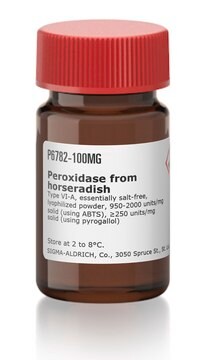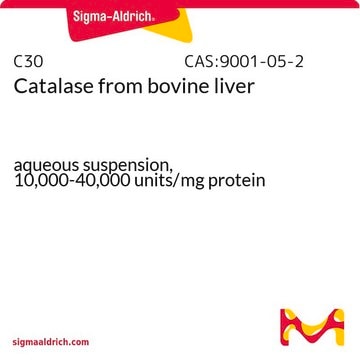G7907
Galactose Oxidase from Dactylium dendroides
≥30 units/mg solid
Synonim(y):
D-Galactose:oxygen 6-oxidoreductase
Zaloguj sięWyświetlanie cen organizacyjnych i kontraktowych
About This Item
Polecane produkty
pochodzenie biologiczne
fungus (Dactylium dendroides)
Poziom jakości
Postać
lyophilized
aktywność właściwa
≥30 units/mg solid
temp. przechowywania
−20°C
Szukasz podobnych produktów? Odwiedź Przewodnik dotyczący porównywania produktów
Powiązane kategorie
Opis ogólny
Galactose oxidase is a member of radicalcoupled copper oxidases family. It is a fungal secretory enzyme.
Galactose oxidase is an extracellular copper-containing enzyme, secreted by the deuteromycete fungus Dactylium dendroides. It catalyzes the oxidation of a range of primary alcohols, including D-galactose, to the corresponding aldehyde, with reduction of oxygen to hydrogen peroxide.
Zastosowanie
Galactose Oxidase from Dactylium dendroides has been used as a component for galactose oxidase treatment of arabinogalactan. It has also been used to co-immobilise with peroxidase for the preparation of a biosensor for galactose detection.
Galactose oxidase may be used as an analytical tool for the specific determination of D-galactose in blood plasma, plant extracts, and phospholipids. It could be used for the characterization of terminal D-galactoside units in several polymers. It may also be useful in the determination of lactose.
Działania biochem./fizjol.
Galactose oxidase catalyzes the coversion of D-galactose to D-galacto-hexodialdose.
2-Deoxy-D-galactose, lactose, melibiose, raffinose and stachyose react with galactose oxidase in the peroxidase:o-tolidine system.
Essentially no oxidation of D-glucose, L-galactose, L-arabinose or D-glucuronate has been observed.
2-Deoxy-D-galactose, lactose, melibiose, raffinose and stachyose react with galactose oxidase in the peroxidase:o-tolidine system.
Essentially no oxidation of D-glucose, L-galactose, L-arabinose or D-glucuronate has been observed.
Galactose oxidase has several applications in bioanalytics and histology. This free radical enzyme possess high substrate specificity.
Definicja jednostki
One unit will produce a ΔA425 of 1.0 per min at pH 6.0 at 25 °C, in a peroxidase and o-tolidine system. Reaction volume = 3.4 mL. Light path = 1 cm.
Postać fizyczna
Lyophilized, contains buffer salts and stabilizer
Uwaga dotycząca przygotowania
Chromatographically purified
inhibitor
Numer produktu
Opis
Cennik
Hasło ostrzegawcze
Danger
Zwroty wskazujące rodzaj zagrożenia
Zwroty wskazujące środki ostrożności
Klasyfikacja zagrożeń
Resp. Sens. 1
Kod klasy składowania
11 - Combustible Solids
Klasa zagrożenia wodnego (WGK)
WGK 1
Temperatura zapłonu (°F)
Not applicable
Temperatura zapłonu (°C)
Not applicable
Certyfikaty analizy (CoA)
Poszukaj Certyfikaty analizy (CoA), wpisując numer partii/serii produktów. Numery serii i partii można znaleźć na etykiecie produktu po słowach „seria” lub „partia”.
Masz już ten produkt?
Dokumenty związane z niedawno zakupionymi produktami zostały zamieszczone w Bibliotece dokumentów.
Klienci oglądali również te produkty
Development of an immunoassay for larch arabinogalactan and its use in the detection of larch arabinogalactan in rat blood
Groman E V and Gou D
Carbohydrate Research, 301(1-2), 69-76 (1997)
Z Markus et al.
Applied microbiology, 13(5), 686-693 (1965-09-01)
The effects on enzyme production of inoculum size and age, medium composition, and culture conditions were studied in shake flasks and in a pilot-plant fermentor. Using a medium consisting of glucose, yeast extract, and inorganic salts in deionized water, we
Grant E Henderson et al.
Bioconjugate chemistry, 22(5), 903-912 (2011-03-15)
The site-specific modification of proteins is expected to be an important capability for the synthesis of bioconjugates in the future. However, the traditional repertoire of reactions available for the direct modification of proteins suffers from lack of specificity, necessitating costly
A R Shatzman et al.
Journal of bacteriology, 130(1), 455-463 (1977-04-01)
The effects of pH and growth density on the amount of an extracellular enzyme, galactose oxidase, synthesized by the fungus Dactylium dendroides were studied. Growth at a pH below 6.7 caused a decrease in the ability of the organism to
Biocatalytic desymmetrization of an atropisomer with both an enantioselective oxidase and ketoreductases.
Bo Yuan et al.
Angewandte Chemie (International ed. in English), 49(39), 7010-7013 (2010-08-18)
Nasz zespół naukowców ma doświadczenie we wszystkich obszarach badań, w tym w naukach przyrodniczych, materiałoznawstwie, syntezie chemicznej, chromatografii, analityce i wielu innych dziedzinach.
Skontaktuj się z zespołem ds. pomocy technicznej













